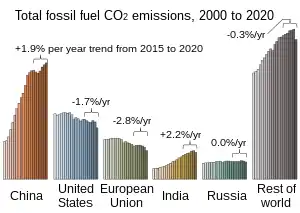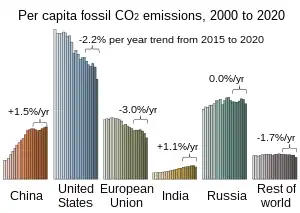This article discusses the debate surrounding China's economic responsibilities in terms of climate change mitigation and efforts to mitigate climate change within China.
In 2006, China surpassed the United States as the country with the highest total carbon dioxide (CO2) emissions rate.[1]


The 'pros': China should be spending more of its resources
Highest total emissions
In 2006, China's (including Taiwan) CO2 emissions surpassed those of the US by 8%, according to the Netherlands Environmental Assessment Agency.[3] Compared to the previous year, China's total emissions increased by 9% (to 6.2 billion tons of CO2), while emissions in the US decreased by 1.4% (to 5.8 billion), compared to the previous year.
NGOs
Beginning with a joint statement on the Kyoto Protocol in Bali in December 2007, Chinese non-governmental organizations (NGOs), in cooperation with international NGOs, assumed a more prominent role in efforts to mitigate climate change within China. NGO activity in China is restricted by government controls and international requirements.[4]
The toll on GDP
A federal financial auditing project—the 'Green GDP' -- has focused on the economic losses incurred by pollution. The project began in 2004 to incorporate the externalities of previously unaccounted-for environmental costs, but soon produced results that were much worse than anticipated. The program stopped in 2007.[5]
The fines for violating CO2-mitigating regulations are too low
Firms facing the choice of either paying a given fine for their effluence into community streams, or spending ten times as much on waste treatment, usually opt to pay the fine and continue polluting.[6] Provincial officials themselves complain that the fines are too low to enable them to enforce federal environmental regulations.[7]
Poor delegation of authority
The problem of ineffectual fines is compounded by the cumbersome delegation of authority over CO2-related issues. For instance, while water pollution as a problem is the responsibility of SEPA (China's equivalent of the United States Environmental Protection Agency), the water itself, in its specific functions or locations, comes under the control of three other separate ministries: Ministry of Construction (deals with sewage), Ministry of Land and Resources (controls groundwater), and Ministry of Water Resources (manages water in general).
In 2007, Pan Yue, vice minister of the State Environmental Protection Administration, said that pollution in China was costing its economy about 8-13% of its GDP.[8]
The 'cons': China should not be spending more of its resources
The large scale of current mitigation

As of 2008, China's per capita emissions of CO2 were still one-quarter of that of the US.[9] Though China continues to build emissions-intensive coal-fired power plants, its "rate of development of renewable energy is even faster".[10]
There is great interest in solar power in China. The world's market share of China's photovoltaic units manufacturers grew from approximately 1% in 2003 to 18% in 2007,[11] with one of the largest Chinese manufacturers of these devices being the Chinese solar company Suntech.[12] Although the overwhelming majority of the photovoltaic units are exported, plans are under to increase the installed capacity to at least 1,800 MW by 2020.[13] Some officials expect the plans to be significantly over-fulfilled, with the installed capacity reaching possibly as much as 10,000 megawatts by 2020.[13]
Due to the growing demand for photovoltaic electricity, more companies (Aleo Solar, Global Solar, Anwell,[14] CMC Magnetics, etc.) have entered into the photovoltaic market, which is expected to lower the cost of PV cells.
Solar water heating is already used extensively throughout the country.[15]
China also has embarked upon a 9 million acre (36,000 km2) reforestation project—the Green Wall of China—that may become the largest ecological project in history; it is projected to be finished by 2050 at a cost of up to US$8 billion.[16]
Keeping emissions growth at less than GDP growth
Considering that energy consumption in most developed countries has usually grown faster than GDP during the early stages of industrialization, it is to China's credit that while its GDP has grown by 9.5% per year over the last 27 years, its CO2 emissions have increased by only about 5.4% per year,[10][9] meaning that its carbon intensity (its carbon emissions per unit of GDP) has decreased during that time, though it remains among the highest of any of the developed or developing nations.
Emissions contributed by multinationals in China
Chinese officials claim that they are doing a great deal that is often not visible, especially for a country as large, populous, and (rurally) undeveloped as it is. But working against that, and equally non-visible, is the role of multinational ventures in China in contributing to its emissions. It has been estimated that as of 2004, almost a quarter (23%) of China's CO2 emissions were coming from Chinese-made products destined for the West, providing an interesting perspective on China's large trade surplus. Another study shown that around 1/3 emissions from China in 2005 are due to exports.[17] Over half of those emissions driven by demand from the West are from transnationals taking advantage of China's developmental policies favouring heavy manufacturing over regions with more developed environmental laws and enforcement. This includes many of the Walmart-suppliers and other foreign-owned factories that stock department store shelves, particularly in the US,.[18]
China has buttressed its call for joint international responsibility for at least part of China's emissions, by making public, in Jan 2008, Multinationals committed 130 violations of Chinese environmental law.[19]
Opposition from provincial and local officials
However, officials in Beijing cite violations by China's own companies as well—in this case, to illustrate the enormity of the task in front of them in getting compliance for environmental regulations which they see as very progressive. Regional and local officials have been taken to task for this.
For example, in 2006, Premier Wen Jiabao issued a warning to local officials to shut down some of the plants in the most energy-intensive industries, designating at least six industries for slow-down. The following year, those same industries posted a 20.6% increase in output.[20] In 2006 as well, the federal government began banning logging in some locations in order to expand its protection of forests, and at the same time restricted the size of cities and golf courses in order to increase land use efficiency. Yet many of the local officials responsible for carrying out the new regulations essentially ignored them.
Another reason for lack of compliance is apparently because local governments now have a chunk of funding for which they are not beholden to the central government, and are motivated to protect those funding sources which pollute, but pollute profitably.[12]
As a result, SEPA's attempt to use local banks as a means of discouraging companies from carbon-intensive practices has followed a troubled path. Many local governments that have officially implemented the 'Green Credit' policy of loaning only to companies with green practices continue also to protect polluting firms that are profitable, and the banks in some provinces have yet to apply the policy at all.[21]
China is following the example of developed nations

China's leadership worries that China would end up suffering a slowdown in economic growth that would result in "massive unemployment and social unrest".[22][23] To the Chinese, it appears ironic at best that China is being criticized for following the practice of 'pollute first, clean up later' that the Western nations themselves followed during their early stages of capital accumulation.[24]
China is collaborating with developed nations
According to Stanley Barer and Michael J. Phillips writing in the Seattle Post-Intelligencer, the United States signed an agreement with Chinese leaders to form the U.S-China Clean Energy Forum, a private-sector process to accelerate cooperation between the two countries. Through this agreement, China is joining forces with the United States to find ways to cut greenhouse gas emissions. Barer and Phillips wrote that China already has "combined market clout to help reduce the cost premium to adopt clean technologies."[25]
China's short history of emissions versus the industrialized nations' long history
Chinese officials argue that China has been contributing to global warming for only 30 years, while the developed countries have been doing so for 200 years. And since pollution-flagrant early stages of industrialization may have contributed to what China sees as a lack of balance of power, particularly between the US and China,[26] many Chinese officials see global warming mitigation as creating an economic burden that slows its economy and further exacerbates the unequal balance of power.[27]
Chinese officials point out that the highest per capita emissions have long been and still are in the developed countries, not in China.[28] They implied that it is the developed nations who should shoulder a comparable portion of the global cost for reversing the world's emissions, consistent with the polluter pays principle.[29]
China's climate envoy Xie Zhenhua has emphasized China’s stance that rich countries have a greater responsibility regarding climate change than China, though China has been the world’s largest carbon emitter since 2006.[30] His speech at the 2010 climate conference in South Africa conveyed this Chinese position:[31][32]
We are developing countries. We need to develop and eradicate poverty while protecting the environment. We’ve done what we should do, but you [developed countries] haven’t. What right do you have to lecture us?
The lack of a cap on emissions is shared by many
Finally, the provision by which China signed the Kyoto Protocol without committing to a cap was the same provision given to all developing nation signers.[9]
See also
References
- ↑ "China now no. 1 in CO2 emissions; USA in second position". Netherlands Environmental Assessment Agency. 2010-08-31. Archived from the original on October 3, 2008. Retrieved 2010-12-11.
- 1 2 Friedlingstein et al. 2019, Table 7.
- ↑ "PBL Planbureau voor de Leefomgeving".
- ↑ Schröder, Miriam; Melanie Müller (2009). "Chinese paths to climate protection". Development and Cooperation. Frankfurt am Main: Societäts-Verlag. 36 (1): 28–30. Archived from the original on 2010-12-18.
- ↑ Kahn, Joseph; Yardley, Jim (26 August 2007). "As China Roars, Pollution Reaches Deadly Extremes". The New York Times. Retrieved 4 January 2024.
- ↑ Liu, Juliana (2007-09-18). "Can China make the polluter pay?". BBC News. Archived from the original on 2012-11-14. Retrieved 2010-12-11.
- ↑ "China reports | "on the Beijing-Guangzhou fine pollution problem a different view"". webcache.googleusercontent.com. Retrieved 2010-12-11.
- ↑ "Most Chinese Support Green GDP Calculation". China.org.cn. 2007-08-01. Archived from the original on 2011-06-04. Retrieved 2010-12-11.
- 1 2 3 Zeng, N.; Ding, Y.; Pan, J.; Wang, H.; Gregg, J. (2008). "SUSTAINABLE DEVELOPMENT: Climate Change-the Chinese Challenge". Science. 319 (5864): 730–731. doi:10.1126/science.1153368. PMID 18258882. S2CID 206510567. Archived from the original on 2009-03-10. Retrieved 2010-12-11.
- 1 2 "China's Climate Change Challenge Is Also the World's". Retrieved 2008-03-18.
{{cite web}}: CS1 maint: url-status (link) - ↑ Dorn, Jonathan G. "Solar Cell Production Jumps 50 Percent in 2007". Earth Policy Institute. Archived from the original on 2008-05-29. Retrieved 2008-05-30.
- 1 2 "China special: The solar power king". New Scientist.com. 2007-11-07. Archived from the original on 2008-10-05. Retrieved 2010-12-11.
- 1 2 "China solar set to be 5 times 2020 target". Reuters. May 5, 2009. Archived from the original on May 8, 2009. Retrieved June 30, 2017.
- ↑ "Anwell Produces its First Thin Film Solar Panel". Solarbuzz. 2009-09-07.
- ↑ Biello, David (2008-08-04). "China's Big Push for Renewable Energy". SciAm. Archived from the original on 2020-04-27. Retrieved 2010-12-11.
- ↑ Ratliff, Evan. "The Green Wall Of China". Wired. Retrieved 4 January 2024.
- ↑ "33% of China's Carbon Footprint Blamed on Exports". ABC News Abcnews.go.com. 2008-07-29. Archived from the original on 2011-05-22. Retrieved 2010-12-11.
- ↑ Jim WatsonWang Tao (2007-12-20). "Is the west to blame for China's emissions?". Chinadialogue.net. Archived from the original on 2008-10-12. Retrieved 2010-12-11.
- ↑ "Environmental Protection Agency announced the 130 multinational corporations environmental". webcache.googleusercontent.com. Archived from the original on 2008-08-21. Retrieved 2010-12-11.
- ↑ "Toxic cost of China' success". The Sunday Times. Archived from the original on 2015-01-08. Retrieved 2015-01-07.
- ↑ "China green credit 'meets resistance'". Chinadialogue.net. 2008-02-13. Archived from the original on 2011-07-18. Retrieved 2010-12-11.
- ↑ China "does not accept" caps on greenhouse gas emissions
- ↑ Griffiths, Daniel (2007-05-07). "China's mixed messages on climate". BBC News. Archived from the original on 2012-11-14. Retrieved 2010-12-11.
- ↑ Jiang Gaoming (2007-01-12). "The terrible cost of China's growth (part one)". Chinadialogue.net. Archived from the original on 2008-03-29. Retrieved 2010-12-11.
- ↑ Stanley Barer; Michael J. Phillips (May 20, 2008). "U.S.-China cooperation would cut greenhouse gas emissions". Seattle Post-Intelligencer. Archived from the original on 26 September 2019. Retrieved 26 September 2019.
- ↑ "Chinese concern over US dominance". BBC News. 2001-05-25. Archived from the original on 2012-11-14. Retrieved 2010-12-11.
- ↑ "Merkel presses China on climate". BBC News. 2007-08-27. Archived from the original on 2009-05-07. Retrieved 2010-12-11.
- ↑ Blanchard, Ben (2007-08-01). "China blames climate change for extreme weather". Reuters. Archived from the original on 2009-04-28. Retrieved 2010-12-11.
- ↑ García-Portela, Laura. “Moral Responsibility for Climate Change Loss and Damage: A Response to the Excusable Ignorance Objection”, International Journal of Philosophy, Vol. 1 (39), pp. 7-24 (2020).
- ↑ Li, Jane. “China’s Xie Zhenhua is the most important person attending COP26”, Quartz (27 Oct 2021) via Yahoo Finance.
- ↑ Waarlo, Niels (2021-11-04). "Westerse landen moeten in de spiegel kijken, vindt de man achter China's klimaatambities". de Volkskrant (in Dutch). Retrieved 2021-11-05.
- ↑ Li, Jane (27 October 2021). "China's Xie Zhenhua is the most important person attending COP26". Quartz. Retrieved 2021-11-05.
Works cited
- Friedlingstein, Pierre; Jones, Matthew W.; O'Sullivan, Michael; Andrew, Robbie M.; et al. (2019). "Global Carbon Budget 2019". Earth System Science Data. 11 (4): 1783–1838. Bibcode:2019ESSD...11.1783F. doi:10.5194/essd-11-1783-2019. hdl:20.500.11850/385668. ISSN 1866-3508.
External links
- China Takes a New Interest in Energy Efficiency by Keith Bradsher of The New York Times June 15, 2011
- A Green Solution, or the Dark Side to Cleaner Coal? by Keith Bradsher of The New York Times June 14, 2011
- Can China Go Green? No other country is investing so heavily in clean energy. But no other country burns as much coal to fuel its economy, Bill McKibben June 2011 National Geographic (magazine)
- China plots course for green growth amid a boom built on dirty industry; National economic blueprint set to tackle pollution and waste, and invest in renewable energy 4.February.2011
- China Pushes Clean-Energy Agenda Ahead of Summit November 22, 2011